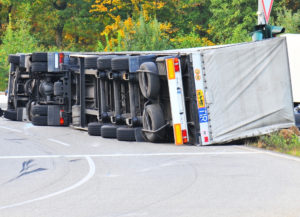
Oregon Truck Roll Over Crashes
What Causes Oregon Truck Roll Over Crashes, Per Our Portland Truck Roll Over Crash Attorney Everyone has seen it, whether in person, or in a
Most trucking operations are interstate, meaning they operate in multiple states throughout the country. This is why a federal agency has enacted certain regulations which govern the conduct of truck drivers and trucking companies no matter what state the driver is coming from, driving through, or going to. The Federal Motor Carrier Safety Administration, or FMCSA, created these strict regulations to apply as the minimum requirements for truck drivers and trucing companies throughout the United States. While there are many reasons why the FMCSA has enacted these regulations, safety is the overarching goal through most of the regulations. This is because FMCSA violations could result in serious personal injuries or the wrongful death of an innocent person. If you or a loved one have been injured in any trucking accident caused by FMCSA violations, please call our Oregon lawyers for federal motor carrier safety administration (FMCSA) violations that hurt you or a loved one to learn how we can help protect your rights.
Why FMCSA Regulations are Important
FMCSA violations are incredibly bad, even if it is just a minor violation. This is because FMCSA regulations set forth the minimum standard and requirements that a trucking company and truck driver must always follow, in addition to any other state laws where the truck is actually operating in.
Most of the regulations pertain to three general areas. The first are equipment regulations which govern what parts truck must have and how the truck must be maintained. The second are truck driver and trucking company conduct in the actual operation of the vehicle. The third are the obligations on trucking companies with their drivers, including post-accident tests and evaluations of truck drivers and big rigs. All of these general types of regulations involve safety considerations, whether the regulations be expressly written in terms of safety of whether the impact of the regulations results in safer operation of the commercial truck.
Liability for FMCSA Violations
When a truck driver or trucking company commit FMCSA violations, they may be fined and could be subjected to even greater penalties such as losing a license to drive or operate. But when FMCSA violations result in serious personal injury trucking accidents or wrongful deaths, truck drivers and trucking company may be exposed to civil liability for their actions in addition to FMCSA penalties and criminal offenses.
When a truck driver or trucking company violates a FMCSA regulation and such violation causes personal injuries to an innocent person, the doctrine of negligence per se may be a useful tool by a victim to help establish that the truck driver was negligent. This is because a violation of a regulation that is meant to protect someone from harm, and the violation causes that harm, results in an automatic finding of negligence if the violation was from a statute (state law) or can be used as evidence of negligence if the violation was from a regulation (agency rule).
This means that victims of Oregon FMCSA violations may be entitled to a negligence per se claim against a truck driver and trucking company which demonstrates evidence of negligence by the sheer fact that a FMCSA regulation was violated and it hurt the victim.
Common FMCSA Violations Which May Result in Liability
There are several FMCSA violations which may result in liability if an innocent person is injured by the actions of a negligent truck driver or trucking company. This includes some fo the following common FMCSA violations:
Bend/Portland, Oregon Federal Motor Carrier Safety Administration (FMCSA) Violations Lawyers
Victims injured by federal motor carrier safety administration (FMCSA) violations should call our law firm. If you or a loved one have been seriously injured or killed as a result of a trucking accident or collision contact the Oregon Truck Accident Lawyers at Kuhlman Law at our number below or fill out the intake form. We offer a free initial case evaluation and handle cases on a contingency fee which means that you pay no money unless we recover.
We handle cases throughout the state including Bend and Portland Oregon, Redmond, Central Oregon, Multnomah County, Deschutes County, Salem, Eugene, Corvallis, Lane County, Medford, Gresham, Albany, Medford, Beaverton, Umatilla, Pendleton, and Hillsboro.
We also have an office in Minneapolis, Minnesota and take Trucking accident cases throughout the Twin Cities, including St. Paul, Hennepin County, Ramsey County, Dakota County, Washington County, Anoka County, Scott County, Blaine, Stillwater, and Saint Paul Minnesota.
Please act quickly, there is a limited time (Statute of Limitations) in which you can bring a claim under the law.

What Causes Oregon Truck Roll Over Crashes, Per Our Portland Truck Roll Over Crash Attorney Everyone has seen it, whether in person, or in a

Portland Trucking Accident Lawyer Explains Causes for Truck Drivers Speeding and Causing Accidents in Oregon Trucks overpower other vehicles on the road all the time.

Understanding How 18 Wheeler Logbooks in Oregon Trucking Accidents Can Help Prove Big Rig Wrecks Truck drivers drive long days and nights, many times on

COVID-19 Increases Risks of Trucking Accidents: Portland Lawyer Explains COVID Trucking Risks in Oregon Truckers nationwide face a number of challenges now with COVID-19 in

Liability Explained by our Portland Trucking Accident Lawyer: Know Trucking Company Liability for Unrealistic Delivery Schedules Very few if any truck drivers work for themselves.

Liability Under FMCAS Regulations for a Drunk Truck Driver Causing a Portland Trucking Accident Drunk driving is a serious problem. According to the CDC, 29